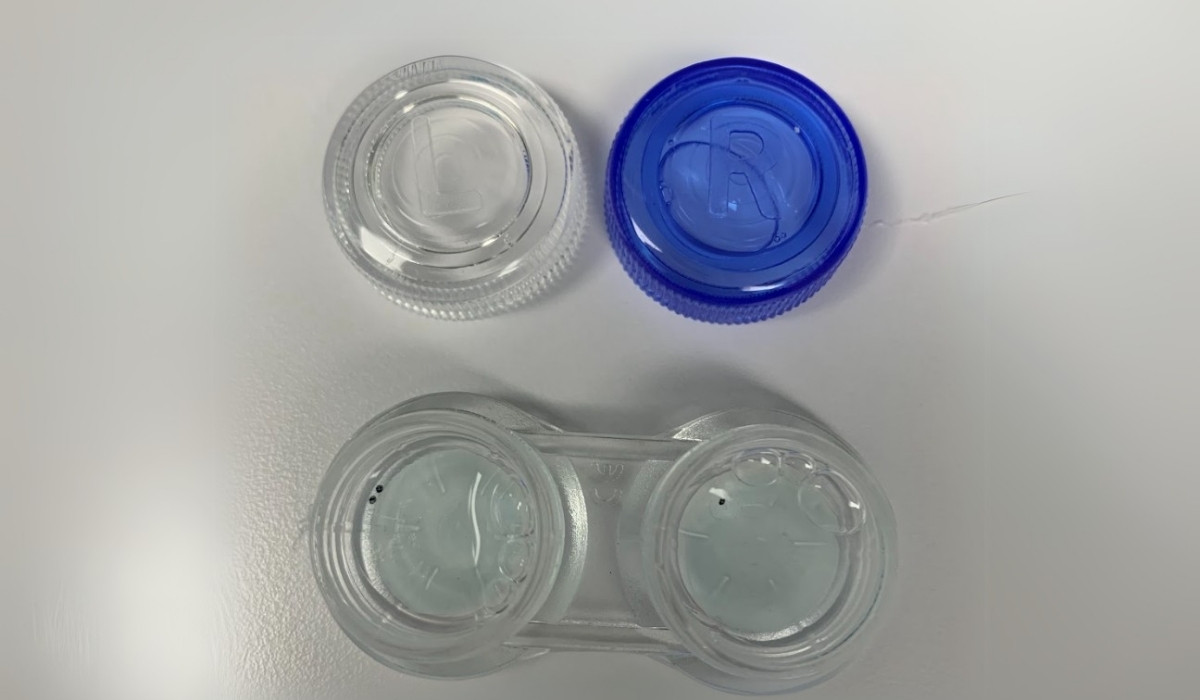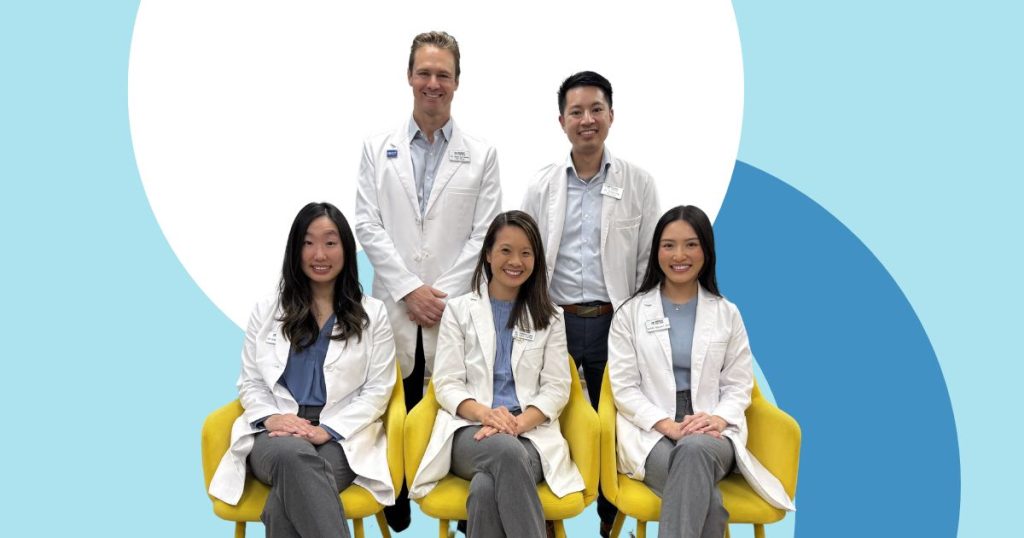Dry eye is a common concern for many contact lens wearers, and finding the right lens can bring much-needed relief. Our goal here is to share information on contact lenses with advanced materials and innovative designs to specifically help with dry eye symptoms. By focusing on lenses that maintain or add moisture, reduce friction, and offer superior comfort, we aim to guide you toward making an informed decision for your eye care needs.

Understanding Dry Eye and Its Impact on Contact Lens Wear
Dry eye occurs when the eyes do not produce or retain enough tears or when the quality of the tears is suboptimal, leading to discomfort and reduced quality of vision. This condition is common among non-contact lens wearers as well, but has a greater impact on contact lens wearers. Contact lenses can exacerbate dry eye in a variety of ways, from impacting the delicate balance of your tear film, absorbing moisture, or creating friction with the eye’s surface. Dry eye is a multifactorial disease, which means that there are a variety of causes that often interact with each other, for example addressing only tear retention, may neglect to address inflammation. Our eye doctors understand that every patient’s experience with dry eye is unique, and to treat dry eye for contact lenses requires a deep understanding of dry eye as well as being at the cutting edge of contact lens technologies.
How Contact Lenses Can Worsen Dry Eye Symptoms
Contact lenses are a fantastic tool for vision correction, but they can also be a culprit in worsening dry eye symptoms. Many contact lens wearers have experienced that familiar gritty, sandy sensation or the persistent redness and irritation that dry eyes bring. Here’s how contact lenses can make dry eyes even more uncomfortable:
- Absorption of Tear Moisture: Contact lenses, especially those not designed for dry eyes, can absorb the natural moisture in your tear film, leaving your eyes feeling parched.
- Disruption of Tear Distribution: Lenses can act as a barrier, preventing your tears from spreading evenly across your eye when you blink. This leads to inconsistent moisture and exacerbates dryness.
- Increased Tear Evaporation: Some contact lens materials can trap heat against the eye, accelerating the evaporation of your tear film and drying out your eyes even more.
- Environmental Triggers: Wearing contacts in dry or windy environments or during extended screen time can further deplete moisture, making dry eyes worse.
- Friction and Discomfort: Contact lenses that aren’t specifically made for dry eye can create more friction against the cornea, which is particularly uncomfortable for those with already sensitive eyes.
- Solution Sensitivity: Sometimes, it’s not just the lenses but the contact lens solution that irritates dry eyes. Some solutions contain preservatives that can cause further dryness and discomfort.
- Oxygen Restriction: Some contact lenses, especially older or less breathable designs, limit oxygen flow to the cornea. Reduced oxygen can compromise eye health and exacerbate dry eye symptoms.
- Deposit Buildup: Contact lenses can accumulate deposits such as protein, lipids, bacteria, or environmental debris (e.g., pollen). This buildup can irritate the eye and worsen dry eye discomfort.
- Mechanical Irritation: Lenses that don’t fit properly or move excessively on the eye can cause mechanical irritation, which can lead to redness and a sensation of something being stuck in the eye.
- Lens Material Impact: Traditional hydrogel lenses, which rely on high water content, may actually draw water away from the eye, worsening dryness. Silicone hydrogel lenses, while more breathable, may not be suitable for everyone.
- Extended Wear Issues: Wearing contact lenses for extended periods, especially overnight, can dry out the eyes significantly. This is because the eyes produce fewer tears during sleep, and the lenses can create a barrier that prevents natural hydration.
- Interaction with Medications: Certain medications, including antihistamines, decongestants, and antidepressants, can reduce tear production. When combined with contact lens wear, this can lead to severe dry eye symptoms.
- Incompatible Eye Drops: Not all eye drops are safe to use with contact lenses. Using incompatible drops can reduce lens comfort and contribute to dryness.
The good news? Specialized contact lenses designed for dry eyes, like scleral lenses or those with advanced moisture-retaining technology, can make a significant difference. Pairing the right lenses with proper eye care and potentially switching to preservative-free solutions can help maintain comfort and clarity, even for those battling dry eye symptoms.
How to Select the Right Contact Lens for Dry Eyes
Finding the perfect contact lens when you have dry eyes requires careful consideration of lens material, design, and care regimen. Here’s a comprehensive guide to help you make an informed choice:
- Material Matters: Silicone hydrogel lenses are often recommended due to their high oxygen permeability. However, some advanced hydrogel lenses designed specifically for dry eyes can also be effective, offering better hydration retention.
- Water Content Balance: While higher water content lenses might seem ideal, they can sometimes pull moisture away from the eye. Look for lenses with lower water content (under 40%) if you struggle with dryness.
- Daily Disposable Lenses: Daily disposables like Acuvue Oasys 1-Day or Alcon Dailies Total1 help prevent deposit buildup from pollen, protein, and bacteria, which can irritate dry eyes.
- Scleral Lenses for Severe Dryness: These lenses create a fluid reservoir over the cornea, offering constant hydration and protection from environmental dryness. They are particularly beneficial for those with severe dry eye or corneal irregularities.
- Orthokeratology (Ortho-K) Lenses: These lenses are worn only at night to reshape the cornea temporarily. Since they are not worn during the day, they reduce the risk of dryness associated with daytime lens wear.
- Hybrid Contact Lenses: These lenses combine a rigid gas-permeable center with a soft outer ring, providing both sharp vision and comfort, which can be a great choice for mild dry eye sufferers.
- Surface Treatments: Lenses with advanced surface treatments, such as Hydraluxe in Acuvue Oasys or MoistureSeal in Bausch & Lomb Ultra lenses, help maintain moisture and reduce friction on the eye’s surface.
- Lens Breathability: Higher oxygen permeability (Dk/t rating) ensures the cornea gets enough oxygen, reducing dryness and discomfort. This is crucial for extended or overnight wear.
- Custom-Fit Lenses: Custom lenses, including custom scleral lenses, can be tailored to fit your eye’s shape perfectly, enhancing comfort and moisture retention.
- Contact Lens Solution Choice: If using reusable lenses, opt for preservative-free solutions or switch to hydrogen peroxide-based systems to avoid irritation from preservatives.
- Use of Rewetting Drops: Always choose eye drops that are compatible with contact lenses. Preservative-free artificial tears can help maintain moisture throughout the day.
- Lifestyle Considerations: Those with dry eyes should avoid prolonged lens wear in dry, windy, or air-conditioned environments, which can exacerbate dryness.
The variety of factors that go into choosing the best contact lenses for a dry eye patient underscore the importance of consulting with our eye doctors who have both the expertise and experience to help you find the best contact lens for you. By taking all these factors into account, you can find a contact lens solution that not only meets your vision needs but also keeps your eyes comfortable and healthy throughout the day.
Top Contact Lens Modalities for Dry Eyes
When choosing contact lenses for dry eyes, it’s essential to understand the different modalities available. Each type offers unique benefits that can help manage dry eye symptoms effectively. Below are the top contact lens options with detailed explanations and examples of recommended brands and types.


Additional Considerations for Managing Dry Eye with Contact Lenses
While selecting the appropriate contact lens is essential, there are additional measures you can take to further alleviate dry eye symptoms. Sometimes it isn’t just the lenses themselves that cause irritation but also the solutions and care products associated with them. Your eye doctor may recommend switching to a preservative-free lens solution if you have developed sensitivities. In other cases, simply opting for daily disposable lenses can eliminate the buildup of proteins, lipids, and other debris that tend to accumulate on reusable lenses. By switching to fresh lenses every day, you reduce the risk of irritation that can arise from deposit accumulation. For those who have a combination of dry eye symptoms and astigmatism, specialized toric lenses are also available. These lenses address the correction of astigmatism while still offering the comfort features that dry eyes demand.
What to Expect During Your Appointment
A detailed eye examination is essential to assess the severity of your dry eye condition and its impact on your contact lens wear. During your appointment, our eye doctors will review your symptoms, evaluate the tear film quality, and check for signs of corneal surface irregularity. They may also examine the fit and performance of your current lenses to determine if a switch would be beneficial. Advanced diagnostic tools, such as corneal topography, may be used to precisely measure the curvature of your eye. This data helps in selecting lenses that better conform to your eye’s shape, offering improved stability and comfort. For many patients, finding the right lens type can mean the difference between constant irritation and enjoying clear, comfortable vision all day long.
Final Thoughts and Next Steps
Choosing the best contact lenses for dry eye is about finding the right lens to address the causes of your dry eye. Our eye doctors are dedicated to helping you navigate these options. If you experience persistent dryness, discomfort, or irritation with your current contacts, schedule an appointment with our experienced eye doctors. We will work with you to assess your symptoms, determine the most suitable contact lens option, and provide personalized advice tailored to your lifestyle. Your comfort and visual health are our top priorities, so call our office today for a consultation and take the first step toward enjoying clear, comfortable vision with lenses designed with your dry eyes in mind.

The Highest Rated Specialty Eye Care Center In Orange County

What Our Patients are Saying
“Insight Vision Center staff were excellent and extremely kind as always. The office is super clean and the technology of the machines they use to assist in examining patients in second to none. I am extremely happy to have found Insight Vision Center and their doctors.”
⭐⭐⭐⭐⭐
Elaine N.
“10/10 experience. Everybody was friendly, and incredibly knowledgeable. I’m so happy I have a go-to optometrist now.”
⭐⭐⭐⭐⭐
Maria M.

Technical Aspects of the Scleral Lens Fitting Process
Determining whether you’re a good candidate for scleral lenses starts with a detailed map of your cornea and precise measurements of your eyes. Our eye doctors use advanced technology to choose the ideal lens design and size for your unique eye shape. Follow-up appointments help fine-tune the lenses to ensure maximum comfort and clear vision. This personalized evaluation sets scleral lenses apart from other options, offering a solution tailored to your specific visual and comfort needs.

Top-Rated Specialty Contact Lens Center in Orange County
At Insight Vision Center Optometry, we’re proud to serve the diverse communities of Orange County and even patients who travel from abroad for expert specialty contact lens care. Conveniently located in Costa Mesa, our clinic is easily accessible from Newport Beach, Huntington Beach, Irvine, Santa Ana, and beyond.
Our world-class team of specialists has extensive experience fitting contact lenses for even the most challenging cases. With cutting-edge technology and a true passion for improving lives, we deliver the highest level of care from early diagnosis to advanced treatment options.
As Orange County’s leading experts in scleral and specialty contact lenses, we’re committed to helping you achieve the best possible results. Whether you need advanced lenses or expert guidance, we’re here to help you see the world clearly again.





